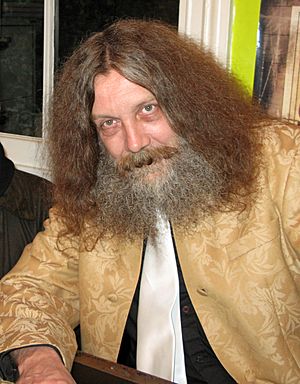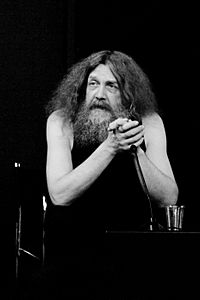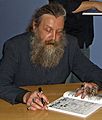Alan Moore facts for kids
Quick facts for kids
Alan Moore
|
|
|---|---|

Moore in 2008
|
|
| Born | 18 November 1953 Northampton, England |
| Pen name |
|
| Occupation | Comics writer, novelist, short story writer, musician, cartoonist, magician, occultist |
| Genre | Science fiction, fiction, non-fiction, superhero, horror |
| Notable works |
|
| Spouse |
|
| Children |
|
Alan Moore (born 18 November 1953) is a famous English author. He is best known for his amazing work in comic books. Some of his most popular comics include Watchmen, V for Vendetta, and From Hell.
Many people, including other writers and critics, believe he is one of the best comic book writers in the English language.
Contents
Early Life and Growing Up

Alan Moore was born on 18 November 1953, in Northampton, England. He grew up in a part of Northampton called The Boroughs. This area was not very wealthy, and many people there struggled.
Even so, Alan Moore loved his community. He said he loved the people and felt like he belonged. He lived with his parents, his younger brother Mike, and his grandmother.
From a young age, Alan loved to read. He started reading at five years old, borrowing many books from the local library. He also began reading comic strips. First, he read British comics like Topper. Later, he discovered American comics such as The Flash and Fantastic Four.
Alan went to Northampton Grammar School. He found it very different from his primary school. He felt that school was trying to teach kids to be too obedient and follow rules without question. This made him dislike school and academic studies.
In the late 1960s, Alan started writing poetry and essays. He published them in fan magazines, which are called fanzines. He even started his own fanzine called Embryo. Through this, he joined a group called the Northampton Arts Lab, which helped him with his magazine.
After school, Alan worked several different jobs. He cleaned toilets and worked in a tannery, which is a place where animal skins are made into leather. In 1973, he met Phyllis Dixon, and they got married. They moved into a small flat and then a council estate in Northampton. Alan felt these jobs were not creative enough, so he decided to try to make a living from art.
Alan Moore's Career in Comics
In the late 1970s, Alan Moore began writing for British underground magazines. He soon became successful, creating comic strips for popular magazines like 2000 AD.
Later, he started working for DC Comics in America. He was one of the first British writers to do major work for American comics. He wrote for famous characters like Batman in Batman: The Killing Joke and Superman in Whatever Happened to the Man of Tomorrow?. He also greatly developed the character Swamp Thing and created original stories like Watchmen.
During this time, Alan Moore helped make comics more respected in both the United States and the United Kingdom. He prefers to call his works "comics" rather than "graphic novels."
In the late 1980s and early 1990s, he left the main comic book industry. He worked on more experimental projects, such as the long story From Hell and the novel Voice of the Fire. He returned to mainstream comics later in the 1990s. He then created America's Best Comics, where he published works like The League of Extraordinary Gentlemen and Promethea. In 2016, he published Jerusalem, a very long novel set in his hometown of Northampton.
In 2023, it was announced that Alan Moore is writing a new fantasy series called The Long London. The first book, The Great When, came out in October 2024. This series will have five books.
Many of Alan Moore's comic books have been made into Hollywood movies. These include From Hell (2001), V for Vendetta (2005), and Watchmen (2009). Alan Moore's work has also influenced many other writers and TV creators. He often says that his stories are inspired by his life in Northampton, England.
Personal Life
Alan Moore is known for his long hair and beard, which he has had since he was young. He also wears many large rings on his hands. People sometimes describe him as looking like a friendly, wise character.
He was born and raised in Northampton, England, and still lives there today. He has used the history of his hometown as inspiration for his novels Voice of the Fire and Jerusalem. His home in Northampton has been described as looking like an "occult bookshop" with many books, records, and interesting items. He enjoys living in Northampton because it allows him to live a quiet life away from the spotlight. He is also a vegetarian.
Alan Moore has two daughters, Leah and Amber, with his first wife, Phyllis. In 2007, he married Melinda Gebbie, who he has worked with on several comics, including Lost Girls. As of 2023, he continues to live a quiet life in Northampton.
Interests in Magic and Occultism
Alan Moore is interested in occultism and ceremonial magic. He is also an anarchist, which means he believes in a society without government. These themes often appear in his works, such as Promethea and From Hell. He has also performed spoken word shows related to these interests.
Awards and Recognition
Alan Moore's work in comic books has received many awards and praise from other writers and critics. Many consider him one of the most important writers in the history of comics.
He has won numerous Jack Kirby Awards, including Best Writer for Swamp Thing and Watchmen. He also won the Inkpot Award in 1985.
Moore has received many Eagle Awards, winning "favourite writer" in both the US and UK categories in 1986. His work Watchmen also won for "favourite comic book."
He won the Comics Buyer's Guide Fan Awards for Favorite Writer several times. He also won for Favorite Comic Book Story (Watchmen) and Favorite Original Graphic Novel (Batman: The Killing Joke).
He was named "Best Comics Writer Ever" at the National Comics Awards in 2001, 2002, and 2003.
He has won the Harvey Award for Best Writer multiple times for works like Watchmen, From Hell, The League of Extraordinary Gentlemen, and Promethea.
Internationally, he has won awards like the German Max & Moritz Prize and French awards such as the Angoulême International Comics Festival Prize for Best Album for Watchmen and V for Vendetta.
In 1988, he won a World Fantasy Award for Best Novella for A Hypothetical Lizard. He also received two International Horror Guild Awards and two Bram Stoker Awards for his graphic novels.
In 2005, Watchmen was the only graphic novel to be included on Time magazine's list of "The 100 Best Novels from 1923 to the Present."
Eisner Awards
Alan Moore has won many Eisner Awards, which are like the "Oscars" of the comic book world.
- Best Writer: He won this award many times, including for Watchmen (1988), Batman: The Killing Joke (1989), From Hell (1995, 1996, 1997), and for his work on The League of Extraordinary Gentlemen, Promethea, and Top 10 (2000, 2001, 2004, 2006).
- Best Writer/Artist: With Dave Gibbons, he won for Watchmen (1988).
- Best Single Issue/Single Story: For Tom Strong #1 (2000) and Promethea #10 (2001).
- Best Serialized Story: For From Hell with Eddie Campbell (1993).
- Best Continuing Series: For Top 10 (2001).
- Best Finite Series/Limited Series: For Watchmen (1988) and The League of Extraordinary Gentlemen, Volume II (2003).
- Best New Series: For Top 10 (2000).
- Best Anthology: For Tomorrow Stories (2000).
- Best Graphic Album: For Watchmen (1988), Batman: The Killing Joke (1989), A Small Killing (1994), and Top 10: The Forty-Niners (2006).
- Best Graphic Album: Reprint: For From Hell (2000).
- The Will Eisner Award Hall of Fame: He was added to the Hall of Fame in 2014, recognizing his lasting impact on comics.
Movies Based on His Work
Many of Alan Moore's comic books have been turned into movies. Here are some of them:
| Year | Title | Director(s) | Studio(s) | Based on | Budget | Box office | Rotten Tomatoes |
|---|---|---|---|---|---|---|---|
| USD$ | |||||||
| 2001 | From Hell | Albert Hughes and Allen Hughes | 20th Century Fox | From Hell by Moore and Eddie Campbell | $35 million | $74.5 million | 57% |
| 2003 | The League of Extraordinary Gentlemen | Stephen Norrington | 20th Century Fox Angry Films International Production Company JD Productions |
The League of Extraordinary Gentlemen by Moore and Kevin O'Neill | $78 million | $179.3 million | 17% |
| 2005 | V for Vendetta | James McTeigue | Warner Bros. Virtual Studios Silver Pictures Anarchos Productions |
V for Vendetta by Moore and David Lloyd | $54 million | $132.5 million | 73% |
| 2009 | Watchmen | Zack Snyder | Warner Bros. Paramount Pictures Legendary Pictures Lawrence Gordon Productions DC Entertainment |
Watchmen by Moore and Dave Gibbons | $130 million | $185.3 million | 65% |
| 2016 | Batman: The Killing Joke | Sam Liu | Warner Bros. DC Entertainment Warner Bros. Animation |
Batman: The Killing Joke by Moore and Brian Bolland | $3.5 million | $4.3 million | 48% |
See Also
 In Spanish: Alan Moore para niños
In Spanish: Alan Moore para niños
- List of comic creators
- List of Comics Journal interview subjects
- List of Eisner Award winners
- List of English writers
- List of Harvey Award winners
- List of occultists
- List of postmodern authors
- List of science fiction authors
Images for kids
 | Sharif Bey |
 | Hale Woodruff |
 | Richmond Barthé |
 | Purvis Young |



